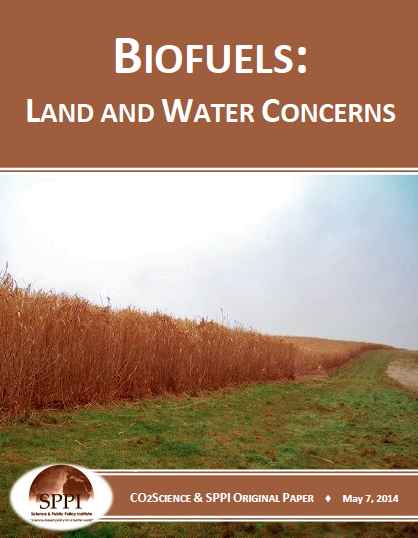News / Science & Technology
Biofuels: Land and Water Concerns

Biofuels are fuels made from organic matter. They include liquid fuels such as ethanol, biodiesel, and methanol; gaseous fuels such as methane and carbon monoxide; and solid fuels such as biochar and the more traditional charcoal. Biofuels may have some environmental advantages over gasoline and diesel fuels, but they are more expensive to produce and cannot supply more than a small part of the world's total transportation energy needs. And because they compete with food crops and nature for land, water, and nutrients, expanding the use of biofuels could negatively affect human health and natural ecosystems.
Elcock (2008) projects 12.9 billion gallons per day of water will be consumed in the manufacture of ethanol by 2030. This "increase accounts for roughly 60% of the total projected nationwide increase in water consumption over the 2005-2030 period, and it is more than double the amount of water projected to be consumed for industrial and commercial use in 2030 by the entire United States."
A 2009 study by Argonne National Laboratory estimated life-cycle water consumption for one gallon of four types of fuel: ethanol, gasoline from domestic conventional crude oil, gasoline from Saudi conventional crude oil, and gasoline from Canadian oil sands (Wu et al., 2009). For ethanol, they estimated an average consumption of 3.0 gallon of water/gallon of corn ethanol during the production process in a corn dry mill, a yield of 2.7 gallons of ethanol per bushel of corn, and the average consumptive use of irrigation water for corn farming in three U.S. Department of Agriculture Regions (5, 6, and 7) representing the vast majority of corn production in the United States. They found "total groundwater and surface water use for corn growing vary significantly across the three regions, producing 1 gallon of corn-based ethanol consumes a net of 10 to 17 gallon of freshwater when the corn is grown in Regions 5 and 6, as compared with 324 gallon when the corn is grown in Region 7." When these figures are adjusted to reflect the lower Btu/gallon of ethanol compared to gasoline (75,700 / 115,000, or .66), the amount of water consumed per gallon of gasoline equivalent ranges from 15.2 to 25.8 gallons in Regions 5 and 6 and 492 gallons in Region 7.
Read More...
